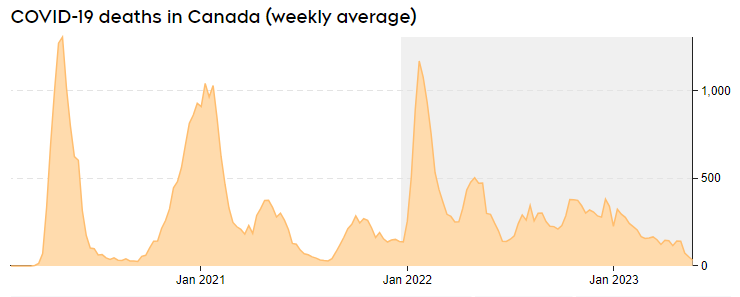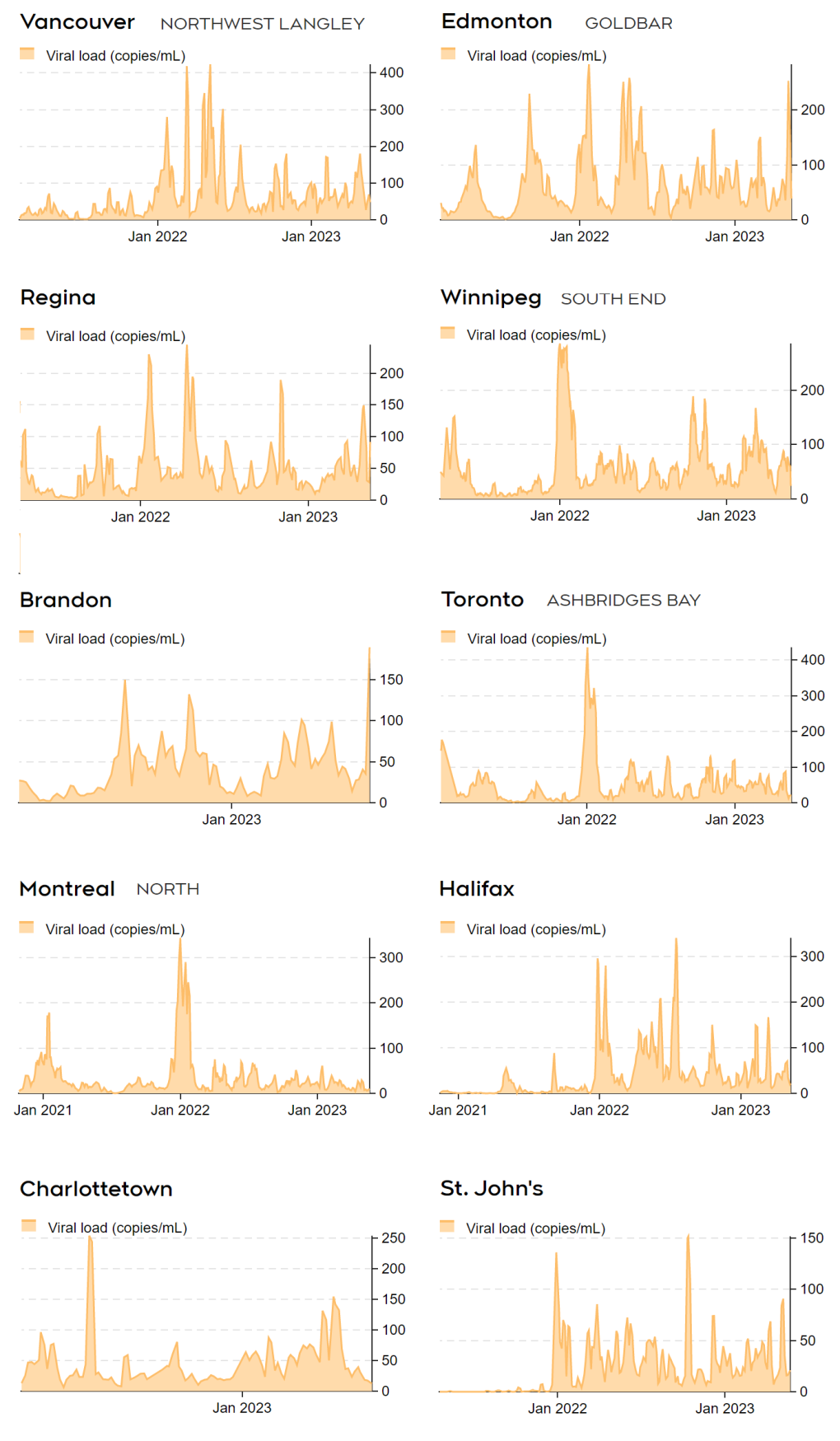
Quebec nurse had to clean up after husband's death in Montreal hospital
On a night she should have been mourning, a nurse from Quebec's Laurentians region says she was forced to clean up her husband after he died at a hospital in Montreal.
Wastewater testing, hospitalization and death data from COVID-19 tell us the virus' spread and severe health outcomes that could result continue to trend downward in Canada. But we're not at the end of COVID-19, and public health experts say we must heed lessons learned from the pandemic and remain vigilant.
Latest numbers from the Public Health Agency of Canada (PHAC) show the country averaged more than 130 people dying per week from COVID-19 in April. That's down from about 290 deaths per week in January.
Hospitalization numbers, meanwhile, have been on a steady decline since the winter and continue to trend downward as we head into summer.
 Chart showing weekly average of deaths in Canada due to COVID-19 (CTVNews.ca)
Chart showing weekly average of deaths in Canada due to COVID-19 (CTVNews.ca)
 Chart showing COVID-19 hospitalization trends since beginning of pandemic in Canada (CTVNews.ca)
Chart showing COVID-19 hospitalization trends since beginning of pandemic in Canada (CTVNews.ca)
But while COVID-19 isn't front and centre compared to last winter, when the highly infectious Omicron variant was wreaking havoc, it’s important to recognize the virus is still here, said infectious disease specialist Dr. Isaac Bogoch.
"We’ll see it waxing and waning for an indefinite period of time. There will be periods where there’s less and more, but it’s not going away," Bogoch told CTVNews.ca in a phone interview.
His message is in line with the World Health Organization's announcement on May 5 that it no longer considers COVID-19 to be a Public Health Emergency of International Concern (PHEIC). "However, that does not mean COVID-19 is over as a global health threat," said Dr. Tedros Adhanom Ghebreyesus, WHO's director general.
In light of the WHO announcement, Canada's federal government said it recognizes that the SARS-CoV-2 virus is "still circulating across Canada and worldwide."
And indeed, while the trend is downward, the latest COVID-19 numbers from PHAC show there are still more than 2,000 people in hospital and about 130 in ICU.
"It's still around, and even though it's putting less pressure on our system, it's still putting pressure on a system that's already stretched," said Bogoch. "So we have an additional pressure that will impact our health system for the foreseeable future."
Just last week, an ER department in Ontario cottage country had to close because of staffing shortages.
And two weeks ago a group of nearly 200 Calgary ER doctors wrote an open letter about staffing shortages, overcrowding and long wait times that patients are facing there.
But with fewer people being admitted to hospital with COVID-19, and those patients who are admitted being less sick in general compared to the past, Bogoch said there's no doubt we're in a better place now than we were a year ago.
"There was a time in the spring of 2021, during the Alpha wave (B.1.1.7) when we ran out of ICU beds," said Bogoch. Going back a bit further to the third Omicron wave, there were 900 ICU patients suffering from COVID-19 in Ontario hospitals alone.
"In a pandemic with too many lows to count, that was horrendous," said Bogoch.
Now that we're in a time when many have seemed to moved on, mentally, to a post-COVID existence, while masking requirements have been relaxed in hospitals across Canada, how vigilant is testing for COVID-19 compared to a year ago?
Some provinces, including B.C. and Saskatchewan, have moved to monthly data reporting for cases, hospitalizations and deaths. Newfoundland and Labrador and Prince Edward Island have moved to reporting every two weeks, while Ontario has moved to weekly reporting.
Bogoch says he looks at all the metrics available – including data from wastewater testing that has become a crucial part of COVID-19 surveillance. He and other experts, including Mark Servos, the Canada Research Chair in Water Quality Protection at the University of Waterloo, note the importance of examining the data as a whole to continue to get a picture of how Canada's doing.
While hospital numbers are important to monitor, the data is imperfect because not all patients who are in hospital with COVID-19 are there because of COVID-19. Added to that, a PCR test can stay positive for many weeks, so a patient being found with COVID-19 in hospital may be an "incidental finding."
Wastewater testing, meanwhile, has become an effective and efficient way to measure not just COVID-19 but any emerging infectious disease that's circulating in the population.
PHAC announced last week the government will be investing in wastewater monitoring across Canada, and will provide funding for the Canadian Water Network for a "proof-of-concept" pilot project.
"Testing a community's sewage (wastewater) can help determine if COVID-19 is increasing or decreasing in a community and provides information on the variants circulating within a community," said PHAC in a statement. "People can also use wastewater trend data to inform their decisions about personal protective measures when going out into their community."
Bogoch called the announcement "brilliant."
"It's a way you can efficiently evaluate emerging and re-emerging infectious diseases with some degree of granularity at a population level in a cost-effective manner. You don't have to screen people with blood tests, you don't have to survey, you literally sample wastewater from a representative sample of the country and look to see what viruses and infections are circulating," he said.
 Charts showing waster testing results in various cities across Canada (CTVNews.ca)
Charts showing waster testing results in various cities across Canada (CTVNews.ca)
The above graphs show a snapshot of the current wastewater levels in various cities across Canada, according to data reported by PHAC. Servos told CTVNews.ca in a phone interview that the peaks and troughs you see happen are normal, and that it's the overall trend over time that one should pay attention to. He said the data shows us there has been a "high amount of COVID that's been circulating" in Canada over the past six months. The decreasing numbers in hospital, according to both Servos and Bogoch, may indicate that people have become immune, likely due to a combination of high rates of vaccinations, the majority of Canadians gaining natural immunity from past infections.
"There's room for improvement when it comes to booster shots for vulnerable populations," Bogoch cautioned. "And it's very important to state we don't want people to get infected. But you can't ignore that recovery from infection, coupled with vaccination, has resulted in pretty robust protection."

On a night she should have been mourning, a nurse from Quebec's Laurentians region says she was forced to clean up her husband after he died at a hospital in Montreal.
A North Bay, Ont., lawyer who abandoned 15 clients – many of them child protection cases – has lost his licence to practise law.
Members of the Bank of Canada's governing council were split on how long the central bank should wait before it starts cutting interest rates when they met earlier this month.
Brad Marchand scored twice, including the winner in the third period, and added an assist as the Boston Bruins downed the Toronto Maple Leafs 4-2 to take a 2-1 lead in their first-round playoff series Wednesday
Cuba's foreign affairs minister has apologized to a Montreal-area family after they were sent the wrong body following the death of a loved one.
Mounties in Nanaimo, B.C., say two late-night revellers are lucky their allegedly drunken antics weren't reported to police after security cameras captured the men trying to steal a heavy sign from a downtown business.
The federal government's proposed change to capital gains taxation is expected to increase taxes on investments and mainly affect wealthy Canadians and businesses. Here's what you need to know about the move.
Canada's Deputy Prime Minister Chrystia Freeland was among the 1,700 delegates attending the two-day First Nations Major Projects Coalition (FNMPC) conference that concluded Tuesday in Toronto.
The daughter of a New Brunswick man recently exonerated from murder, is remembering her father as somebody who, despite a wrongful conviction, never became bitter or angry.

A property tax bill is perplexing a small townhouse community in Fergus, Ont.
When identical twin sisters Kim and Michelle Krezonoski were invited to compete against some of the world’s most elite female runners at last week’s Boston Marathon, they were in disbelief.
The giant stone statues guarding the Lions Gate Bridge have been dressed in custom Vancouver Canucks jerseys as the NHL playoffs get underway.
A local Oilers fan is hoping to see his team cut through the postseason, so he can cut his hair.
A family from Laval, Que. is looking for answers... and their father's body. He died on vacation in Cuba and authorities sent someone else's body back to Canada.
A former educational assistant is calling attention to the rising violence in Alberta's classrooms.
The federal government says its plan to increase taxes on capital gains is aimed at wealthy Canadians to achieve “tax fairness.”
At 6'8" and 350 pounds, there is nothing typical about UBC offensive lineman Giovanni Manu, who was born in Tonga and went to high school in Pitt Meadows.
Kevin the cat has been reunited with his family after enduring a harrowing three-day ordeal while lost at Toronto Pearson International Airport earlier this week.